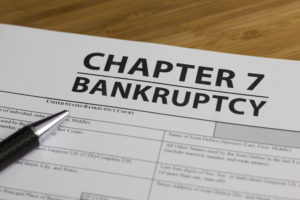Whether due to an economic downturn or other reasons, homeowners associations are not exempt from financial issues. The situation can degenerate even further to the point that an HOA is forced to consider bankruptcy. But, is HOA bankruptcy even a viable option?
Can an Association File for HOA Bankruptcy?
In a word, yes. Much like a business organization, a homeowners association relies on money to stay in operation. This money comes from homeowners in the form of assessments, which the HOA then uses to pay for various services all in an effort to maintain the community and keep property values high. And, similar to a business, when funds dry up, an HOA can also file for bankruptcy.
HOA bankruptcy rarely happens, though there are some cases of it. However, just because an HOA can file for bankruptcy does not mean it should. If your association lacks the necessary funds to make up for all the debts, it is a good idea to consult a bankruptcy attorney.
The Two Types of Bankruptcies
 There are two main types of bankruptcies an HOA can file for: Chapter 7 and Chapter 11.
There are two main types of bankruptcies an HOA can file for: Chapter 7 and Chapter 11.
Chapter 7 bankruptcy will liquidate all of the association’s assets in an attempt to settle its debts. Chapter 11, on the other hand, provides your association with legal protection against collection activities. This means creditors will stop seeking payment as an association reorganizes its affairs, assets, and debts so that it can determine a payment plan.
A primary advantage of Chapter 11 bankruptcy is that it essentially allows your association to renegotiate contract terms. Most courts also prefer this form of bankruptcy for HOAs because it means the local government does not need to get involved. In essence, the association will take care of its own problems and continue managing the community, only deferring to the court for approval of big decisions.
On the downside, this form of HOA bankruptcy can wind up costing your HOA large sums of money, as you must shoulder court costs and attorneys’ fees. Moreover, Chapter 11 bankruptcy only gives your HOA a bit of breathing room as you negotiate the terms of new agreements. Usually, it will not let your association off the hook, free of debt. Bankruptcy judges have even dismissed cases in the past due to organizations lacking a real reorganization strategy.
Reasons for Homeowners Association Bankruptcy
Apart from an economic decline, an HOA can go bankrupt due to a number of causes, the most common of which is poor money management. HOA boards can spend too much or spend money that the association does not have yet, resulting in a bankrupt HOA. Bankruptcy can also stem from underfunded reserves.
An HOA’s primary source of income is homeowner assessments. When multiple homeowners turn delinquent, the HOA can encounter a lack of sufficient funds. In addition, the association can incur large unexpected expenses that its insurance policies do not cover. Homeowners associations also experience fraudulent activity, much like businesses. Embezzlement or internal fraud can go undetected for years without proper financial management and monitoring, ultimately leading to bankruptcy.
What About the Homeowners?
Homeowners in an HOA community pay assessments to keep the association going. As such, homeowners are also held accountable for the association’s debts. It is important for homeowners to settle their share of the HOA’s financial commitments. Otherwise, the HOA can take the necessary steps to obtain the money. This means the association can sell personal property to make up for sizable debts. Keep in mind, though, that this course of action is not something HOAs can just take any time. The HOA must follow certain steps in order to do this, so it is best to check with your attorney first.
Watch Out for Legal Repercussions
 If your HOA board mismanages the association’s finances, then you are at risk of legal liability. HOA boards have a fiduciary duty to exercise good faith and act within the community’s best interests. When the board improperly manages funds, homeowners can claim negligence of fiduciary duties. An individual board member or the board as a whole can be on the receiving end of a lawsuit.
If your HOA board mismanages the association’s finances, then you are at risk of legal liability. HOA boards have a fiduciary duty to exercise good faith and act within the community’s best interests. When the board improperly manages funds, homeowners can claim negligence of fiduciary duties. An individual board member or the board as a whole can be on the receiving end of a lawsuit.
Exhausting All Possible Alternatives
While HOA bankruptcy is an option, it should not be the first option for most homeowners associations. There are other possible courses of action that an HOA can take over filing for bankruptcy. Declaring bankruptcy has significant consequences and can negatively influence your association’s relationship with existing vendors and personnel. Before immediately jumping to bankruptcy, consider the following alternatives:
1. Work Out Repayment Terms With Creditors
Homeowners associations are expected to honor their end of contracts. Although Chapter 11 bankruptcy allows you to legally bypass this, you must first consider negotiating repayment terms with your creditors on your own. Let your creditors know that your association does not have enough funds to settle your debts. Draw up repayment plans that work for both parties. If your board has no experience in this arena, seek help from a professional. It may very well save your association the headache of filing for bankruptcy.
2. Collect Special Assessments
When debts pile up, an HOA looks to its chief source of income to obtain additional funds — the homeowners. Although homeowners already pay regular assessments, an HOA can levy special assessments to cover the cost of its debts. Of course, it is important to act within your association’s governing documents at all times. Look to your CC&Rs for provisions on special assessments. Some states, like California, also have laws concerning special assessments, including a limit on how much you can charge.
Preventing HOA Bankruptcy Is Possible
Although it remains an option, filing for HOA bankruptcy should be an association’s last resort. More often than not, bankruptcy’s root cause is mismanagement of funds. Your HOA board can prevent this from happening by exercising transparency, integrity, and an economical approach to making decisions. As long as your association practices proper budgeting and reserve planning, as well as consistently communicating all financial decisions with homeowners, bankruptcy will be the least of your worries.
If your HOA board needs help managing the association’s finances, turn to an HOA management company like Clark Simson Miller. Give us a call at 865.315.7505 to learn about our services. You can also email us at help@csmhoa.com or contact us online.
RELATED ARTICLES:
- Should HOA Payments Plans Be Offered To Delinquent Homeowners?
- 8 Tips To Improve HOA Financial Stability
- Why Is It Important To Practice Budget Transparency In Your HOA?

